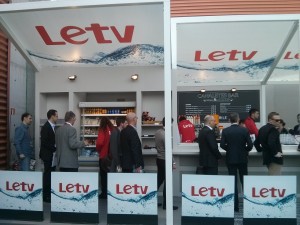INTERNET: LeTV Surprises With Low-Key Global Appearance
Bottom line: LeTV could be a company to watch as it embarks on a global expansion, drawing on a savvy business model that sells smart TVs and smartphones at low prices in exchange for video subscription contracts.

A major telecoms show happening this week in Spain was filled with small bits of news, but one of the biggest surprises came when I stumbled on an area decked out with signage for the racy online video firm LeTV (Shenzhen: 300104). So far as I could tell, none of the company’s many rivals like Youku Tudou (NYSE: YOKU) and iQiyi were at the show, and even global leader YouTube was absent. That’s not hard to understand, since the Mobile World Congress taking place in Barcelona is a telecoms show whose main attendees are telecoms equipment and smartphone makers.
After making my discovery I looked around for some company representatives, and quickly realized that LeTV had simply bought the advertising rights for this small outdoor eating area, for a hefty cost I would later find out was about $150,000. Only after making some inquiries with my contacts from the company’s home office was I able to arrange a meeting with 2 of LeTV’s 4 employees who were attending the show, all from its recently established international office in Hong Kong.
LeTV was one of China’s first players in the online video market, but lived a life of relative obscurity in its early days as foreign-funded names like Youku Tudou, Baidu-backed (Nasdaq: BIDU) iQiyi and Sohu (Nasdaq: SOHU) video took most of the spotlight. But LeTV’s early entry to the market seems to be finally paying some strong dividends, including its current status as China’s only player making substantial profits.
Its rapid rise has ignited a recent fire under its stock, which has nearly tripled since late December, giving the company a market value of 64 billion yuan, or just over $10 billion. By comparison, Youku Tudou, generally considered China’s largest player and formerly also its most valuable, is worth just $3.3 billion, as its shares have lost more than half of their value over the last year.
So, what is behind LeTV’s sudden surge, and why was it attending the trade show in Spain? Unlike many of its peers which only provide video services, LeTV has focused on a strategy of selling Internet-enabled smart TVs at cost or even at a loss. It then makes money when people subscribe to its video products delivered over those TVs. The company has just announced another move into smartphones, in a bid to repeat that model in the mobile space.
The model seems to be working, which perhaps is why many of China’s other video companies are now exploring a similar strategy. LeTV sold an impressive 1.5 million smart TVs in China last year alone, and is now aiming to export that model to other markets, starting with Hong Kong and Taiwan, according to Sierra Ma, who is leading the company’s global expansion and talked to me in Spain.
Ma’s colleague Andy Chan also briefed me on their efforts to date, including LeTV’s signing up of 15,000 subscribers in Hong Kong since its recent launch there through a “hunger promotion” offering a limited number of TVs to online buyers. Such a strategy has proved immensely popular for smartphone sensation Xiaomi, and many other companies have started to imitate it in the Chinese land of copycats.
LeTV has relatively big hopes this year for Hong Kong and Taiwan, where it plans to launch in the fourth quarter, due to the cultural and language similarities between the markets. Chan said the company is most likely to explore Southeast Asian markets like Singapore and Malaysia next, which also have large Chinese-speaking populations. But it’s also making some initial contacts with telcos in other regions, including the likes of US giant AT&T (NYSE: T), Europe’s Vodafone (London: VOD) and India’s Tata Teleservices (Mumbai: TTLS).
Ma said she was also surprised at the attention LeTV got at the show, including queries from both reporters and potential partners wanting to know more about the company. If all goes according to plan, she said, LeTV will be back in Barcelona next year with a real booth to showcase its products. I don’t like to get caught up in company hype, but LeTV really does seem like a company with an increasingly solid business model and therefore a player to watch as it tries to go global.
Related posts:
